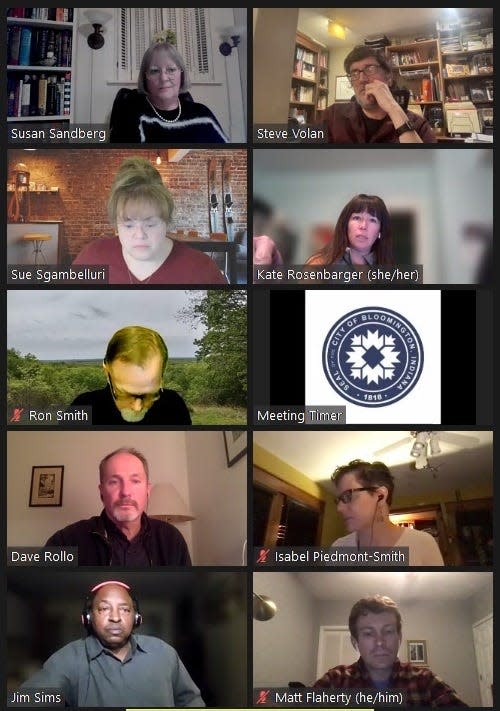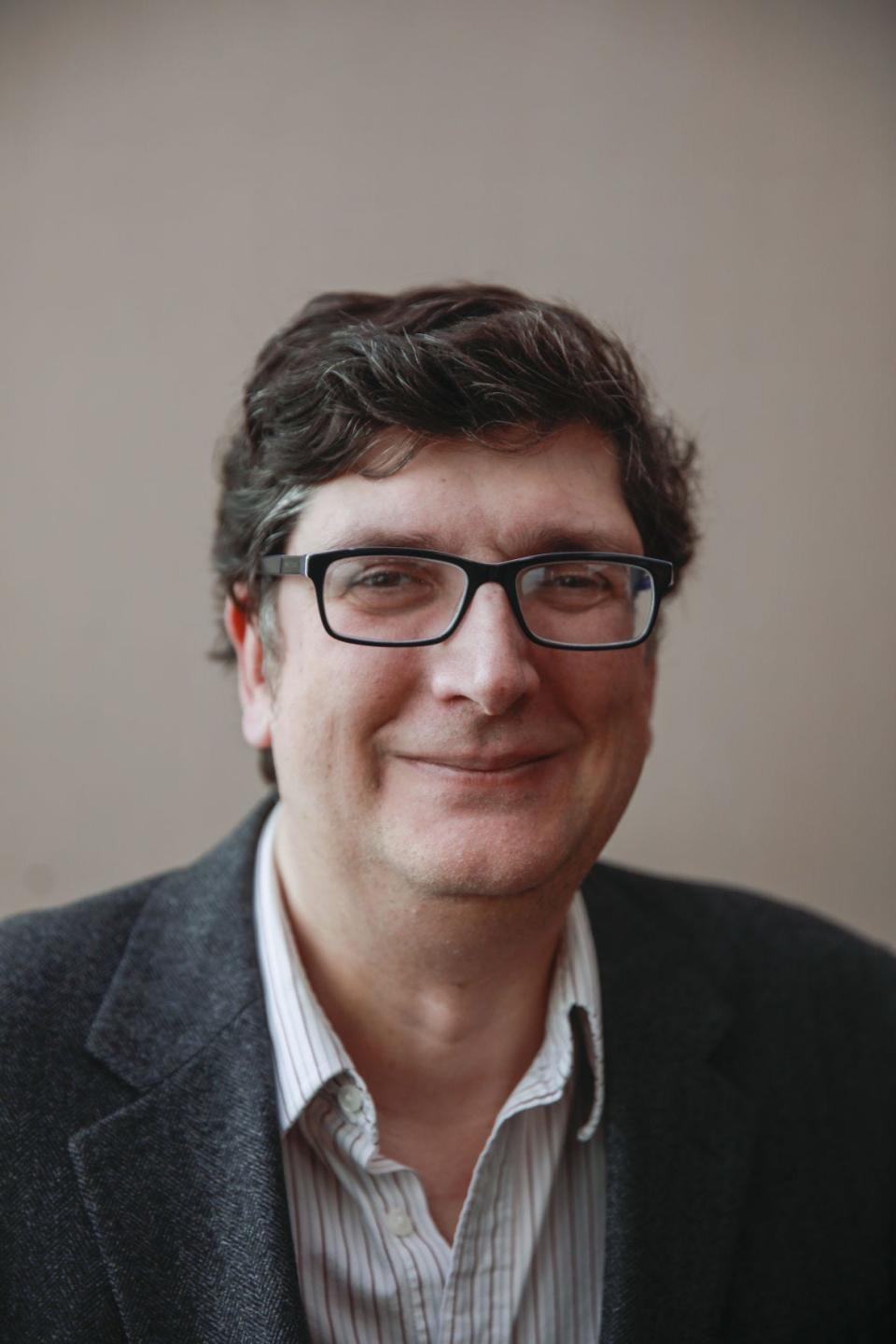Interruptions, eye rolling and more in another 5-4 vote by the Bloomington City Council

The Bloomington City Council’s 5-4 dynamic reared its head again this week as members discussed council procedure in a meeting filled with eye rolling, interruptions and one member’s accusations that his colleagues can’t do math.
The underlying legislation, to eliminate most standing committees, was adopted by a 5-4 vote Wednesday night and will, depending on whom you ask, streamline the council’s business and reduce confusion among constituents — or rush legislation and de-emphasize the council’s work on some critical challenges such as climate change.
Fissures: Bloomington City Council often votes 5-4. Does it reveal something deeper?
The legislation, sponsored by council President Susan Sandberg, along with newly elected council Vice President Sue Sgambelluri and immediate past President Jim Sims, eliminated most standing committees, including those that deal with public safety, land use and housing — topics that generated some of the most contentious council meetings last year and some clashes with Mayor John Hamilton.

The proposed elimination of the Climate Action & Resilience Committee especially caused consternation among some council members and the public, who said the move indicated the council majority is attempting to de-emphasize the city’s efforts to combat climate change.
Sandberg strongly rejected that contention, telling The Herald-Times that sponsors simply believe rather than having important topics discussed by just some council members in committees, the matters instead should be discussed by all council members either in regular session or the committee of the whole, which usually is attended by all nine members.
“It is not a diminishment,” Sandberg said. “Just a return to … a more efficient and effective way of conducting our business.”
However, council member Stephen Volan called that argument “absurd.”

If Sandberg were interested in a more efficient process, she never would have allowed a meeting last March to continue for nine hours, he said. And the sponsors would not have dragged their colleagues through six meetings in 15 days last year on a proposal to allow for more duplexes in the city.
Marathon session: Proposal aimed at creating public space for homeless people fails
Standing committees triage the legislative process, Volan said, and allow some members of the council to determine which questions are important enough to be deliberated by all council members.
The majority’s wish seems to be to dispatch legislation quickly, he said, which conflicts with their stated intent to reduce public confusion and allow more public input.
“It shouldn’t be our job to get stuff done quickly,” Volan said. “It should be our job to get stuff done thoughtfully.”
Sandberg countered the Hamilton administration and city staffers supported the move, in part because the committee structure requires them to make similar presentations at several meetings. That likely will be reduced by dispensing with the standing committees.
Council member Dave Rollo said both the committee structure and the committee of the whole structure have pros and cons, but he prefers the latter, in part because he believes it will reduce confusion among constituents and because he wants to hear from all colleagues on all matters.

“I just think the committee of the whole is so far superior,” he said.
Council members Matt Flaherty and Isabel Piedmont-Smith disagreed, saying standing committees allow for a more proactive approach, which is critical to addressing long-term challenges such as climate change, housing and land use.
While council members can create special committees, some council members argued that those would be reactive and created for a specific purpose that arises during deliberations — whereas standing committees allow council members to get ahead of challenges.
Volan said the committee of the whole structure dispatches legislation more quickly and “doesn’t allow for a respectful development of amendments,” he said.
“We’re the only city I know that does business this way,” Volan said. “They think it’s superior. It’s not.”
Rollo, for his part, said he is sympathetic to concerns raised by the four-member minority, including that repetitive and late meetings make it difficult for some people, especially parents with young children and hourly workers, to pay attention to matters that concern them. Rollo said he would be happy to work with Volan to try to address those concerns.
Late in the meeting, the council unanimously approved language that retained the Climate Action & Resilience Committee. Members of the five-member majority said they supported the move in an effort to compromise with the four-member minority that hoped to keep the standing committees.
However, the notion that retaining the climate committee was a compromise did not go over well, with Volan saying it made a “mockery of the word ‘compromise.’”
Flaherty, who usually explains his votes, this time just made a short statement: “It’s hard for me to overstate how disappointed I am in five of my colleagues tonight.”
The council’s next regular session is scheduled for Feb. 2.
Council clashes
Wednesday’s Bloomington City Council meeting included several heated exchanges between council members.
Council President Susan Sandberg at one point rolled her eyes as council member Stephen Volan talked about committees.
When Volan talked about Sandberg’s committee attendance, Sandberg replied, “Accusing me of not being in attendance at meetings is something that I would hope that you would not go there with me.”
About three hours into the meeting, council member Jim Sims prefaced a comment by saying that he knew he would “get rebutted on top of the rebuttal for the rebuttal,” prompting Volan to reply that he didn’t appreciate getting mocked for making use of his right of rebuttal.
An exchange between Volan and council member Dave Rollo:
Volan: The sponsors don’t like doing math. They don’t like thinking about decision theory and how they might have to anticipate possible outcomes that might dictate a different schedule … They’ve never gotten the basic idea behind committees … They don’t get committees or procedure. They only know what they were used to back in the good old days when their convenience …
Rollo: Council member Volan, … please address the legislation and not the integrity … or the motives of the sponsors.
And later:
Volan: I believe that the sponsors have not done their homework, sir. And they don’t want to do their homework. They think reading the packet is enough. Is that a personal attack, too, sir?
Rollo: Yes it is. It is. … I think that’s incredibly unfair. We’re debating procedure, and … there are pros and cons to both sides. Please address … why you’ve opposed this resolution.
Volan: I think this is a factional effort to prevent deserved critique. … This is not the first time it’s happened to me, sir.
Rollo: You have the floor.
Volan: Until you interrupt me again. The homework, Mr. Rollo, has always been understanding why rules of order exist. Why Robert’s (Rules of Order) is set up the way it is. And how other ordinary assemblies, like ours, do business. And they have not done that homework.”
Boris Ladwig is the city government reporter for The Herald-Times. Contact him at bladwig@heraldt.com.
This article originally appeared on The Herald-Times: Bloomington City Council votes 5-4 again; members get prickly

